-
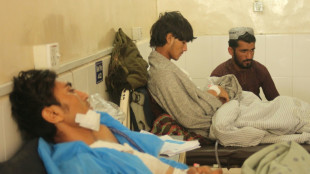 Tens of thousands of Afghans displaced by Pakistan conflict
Tens of thousands of Afghans displaced by Pakistan conflict
-
Unbeaten South Africa face 'fresh start' in semi-final: Markram
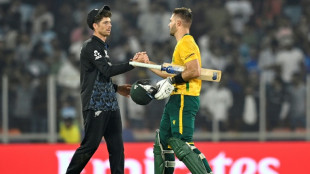
-
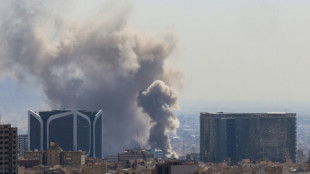 Iran steps up attacks on Mideast economy in response to US-Israeli strikes
Iran steps up attacks on Mideast economy in response to US-Israeli strikes
-
'We back ourselves': Underdogs New Zealand eye T20 World Cup final
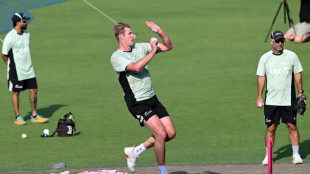
-
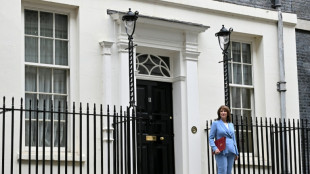 UK cuts 2026 growth forecast, flags Iran war risk
UK cuts 2026 growth forecast, flags Iran war risk
-
Guardiola says Premier League teams must adapt to set-piece threat

-
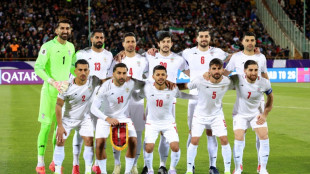 Will Iran take part in the 2026 World Cup?
Will Iran take part in the 2026 World Cup?
-
Afghans escape from Iranian cities to get home
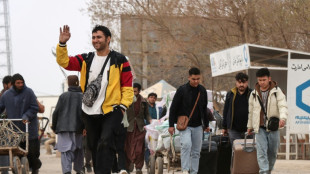
-
 'Peaky Blinders' stars hit Brum red carpet for movie premiere
'Peaky Blinders' stars hit Brum red carpet for movie premiere
-
Brazil's Flamengo sack coach Filipe Luis despite 8-0 win
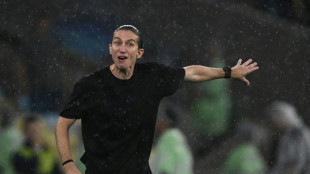
-
 England 'not fearing anything' against India, says Curran
England 'not fearing anything' against India, says Curran
-
Global markets turmoil intensifies on Iran war
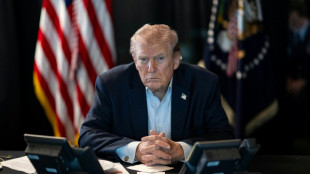
-
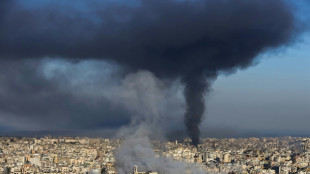 Iran targets Mideast energy industry and US missions
Iran targets Mideast energy industry and US missions
-
Rahm accuses DP World Tour of 'extorting players' with LIV deal

-
 Thousands of Afghans displaced by Pakistan conflict
Thousands of Afghans displaced by Pakistan conflict
-
China, North Korea make winning starts at Women's Asian Cup

-
 EU asylum applications down but Iran concerns mount
EU asylum applications down but Iran concerns mount
-
Rahm accuses DP World Tour of 'exorting players' with LIV deal

-
 Drones hit US embassy as vengeful Iran targets Mideast cities
Drones hit US embassy as vengeful Iran targets Mideast cities
-
Mideast war exposes fragile oil, gas dependency

-
 How the T20 World Cup semi-finalists shape up
How the T20 World Cup semi-finalists shape up
-
Oil extends gains and stocks dive as Middle East war spreads

-
 Warming El Nino may return later this year: UN
Warming El Nino may return later this year: UN
-
Trump says US-UK relationship 'not like it used to be'

-
 Eight years on, trial begins in Argentina submarine implosion
Eight years on, trial begins in Argentina submarine implosion
-
Beijing votes out three generals from political advisory body

-
 Oil extends gains and stocks dive as Iran conflict spreads
Oil extends gains and stocks dive as Iran conflict spreads
-
The French village where Ayatollah Khomeini fomented Iran's revolution

-
 South Africa, India eye T20 World Cup rematch as semi-finals begin
South Africa, India eye T20 World Cup rematch as semi-finals begin
-
Trump hosts Germany's Merz for talks eclipsed by Mideast war

-
 Second-hand phones surf rising green consumer wave
Second-hand phones surf rising green consumer wave
-
Pakistanis at remote border describe scramble to leave Iran

-
 China votes to oust three generals from political advisory body
China votes to oust three generals from political advisory body
-
Murray scores 45 as Nuggets hold off Jazz

-
 Five things about the 2026 F1 season
Five things about the 2026 F1 season
-
Scrum-half Gibson-Park: Ireland's 'petit general'

-
 Geopolitical storm leaves isolated Greenlanders hanging by a telecoms thread
Geopolitical storm leaves isolated Greenlanders hanging by a telecoms thread
-
Myong hat-trick as North Korea cruise at Women's Asian Cup

-
 AI disinformation turns Nepal polls into 'digital battleground'
AI disinformation turns Nepal polls into 'digital battleground'
-
New Israel, Iran attacks across region: Latest developments in Middle East war

-
 China's overstretched healthcare looks to AI boom
China's overstretched healthcare looks to AI boom
-
Oil extends gains and stocks drop as Iran conflict spreads

-
 Rituals of resilience: how Afghan women stay sane in their 'cage'
Rituals of resilience: how Afghan women stay sane in their 'cage'
-
Strait of Hormuz impasse squeezes world shipping

-
 Fresh Israel, Iran attacks across region: Latest developments in Middle East war
Fresh Israel, Iran attacks across region: Latest developments in Middle East war
-
Oscar-nominated Iranian doc offers different vision of leadership

-
 Oscar-nominated docs take on hot-button US social issues
Oscar-nominated docs take on hot-button US social issues
-
'I couldn't breathe': The dark side of Bolivia's silver boom

-
 Trump warns of longer Iran war as Riyadh, Beirut hit
Trump warns of longer Iran war as Riyadh, Beirut hit
-
Underground party scene: Israelis celebrate Purim in air raid shelters

Russia and the terrorism against Ukraine
Russia is a terrorist state. Since 24 February 2022, everyone on our planet knows this. Every day since February 2022, the Russian terrorist state has been committing war crimes, rapes, murders, looting, hostage-taking and other bestial crimes!
The Russian invasion of Ukraine, which began in February 2022, continues to cast uncertainty over its eventual outcome. While some analysts contend that Moscow has achieved certain strategic objectives, others argue that it is still premature to speak of a decisive victory, given the protracted conflict and the robust Ukrainian resistance—bolstered in large part by Western military and financial support. In this context, fundamental questions arise: Has Russia won the war? What scenarios lie ahead for Ukraine?
Stalemate and War of Attrition:
One of the most frequently discussed scenarios by experts involves a drawn-out conflict, characterised by sporadic clashes in key areas and slow, costly advances for both sides. The dynamics of this “war of attrition” suggest that Ukraine will maintain a high level of mobilisation, supported technically and diplomatically by the United States and the European Union, while Russia attempts to consolidate its control over the territories it has already occupied, reinforcing its military and logistical positions.
Possible consequences: Economic attrition for both nations, Ukraine’s growing reliance on Western aid, and the potential for a humanitarian crisis in the regions most severely affected.
Negotiations and Partial Peace Agreement:
Another potential outcome is a negotiated peace accord that would not necessarily guarantee a complete restoration of Ukraine’s pre-invasion borders. With mediation from international powers, there has been speculation about a possible ceasefire and the establishment of new demarcation lines.
Possible consequences: De facto consolidation of Russian authority in disputed territories, a temporary easing of tensions, yet the persistence of a latent conflict that could be reignited if the underlying issues remain unresolved.
Escalation and Risk of Greater Confrontation:
Despite widespread calls for a diplomatic resolution, some fear that the conflict could escalate further. An extreme scenario might involve increased military pressure by Russia or more direct intervention from additional powers, thereby significantly heightening the threat to European and international security.
Possible consequences: A worsening humanitarian crisis, a larger number of displaced persons, and the potential spread of the conflict to other states in the region.
Ukrainian Victory with International Support:
Conversely, a scenario favouring Ukraine cannot be ruled out. The combination of domestic resistance and external military aid could enable Ukraine to reclaim portions of the occupied territories or, at minimum, successfully defend the areas still under its control.
Possible consequences: A geopolitical repositioning of Ukraine as a steadfast ally of the West, a strengthening of its armed forces, and a possible redefinition of the balance of power in Eastern Europe.
Has Russia Won the War?
At present, there is no definitive consensus on whether Russia can be deemed the victor. Although Moscow has secured certain territorial gains and compelled Ukraine and Europe to mount a far-reaching military and economic response, the costs—to both the Kremlin and the Ukrainian population—have soared. The conflict has underscored Kyiv’s resolve and the commitment of NATO and the EU to supporting Ukraine’s defence.
Ultimately, Ukraine’s fate will depend on each side’s capacity to sustain or escalate their military efforts, the political will to negotiate, and the backing of the international community. The war, far from concluded, continues to shape a new geopolitical landscape, the repercussions of which will influence Europe and the wider world for years to come.

Israel has every right to destroy Hamas and Hezbollah!

What are the effects of climate change on sea flora?

Azerbaijan is in control: Armenians flee Nagorno-Karabakh

EU countries agree on watered-down car emissions proposal

Hungary-Dictator PM Orban claims EU 'deceived' Hungary

Europe: How gas prices fell from €300 to €35 MWh in one year

British musicians lose gigs in Europe since Brexit

Japan: Toyota stops production due to computer system error

Edinburgh: Totempfahl bei kanadischen Indigenen zurück

Russian Central Bank: Urgent meeting due to rouble devaluation
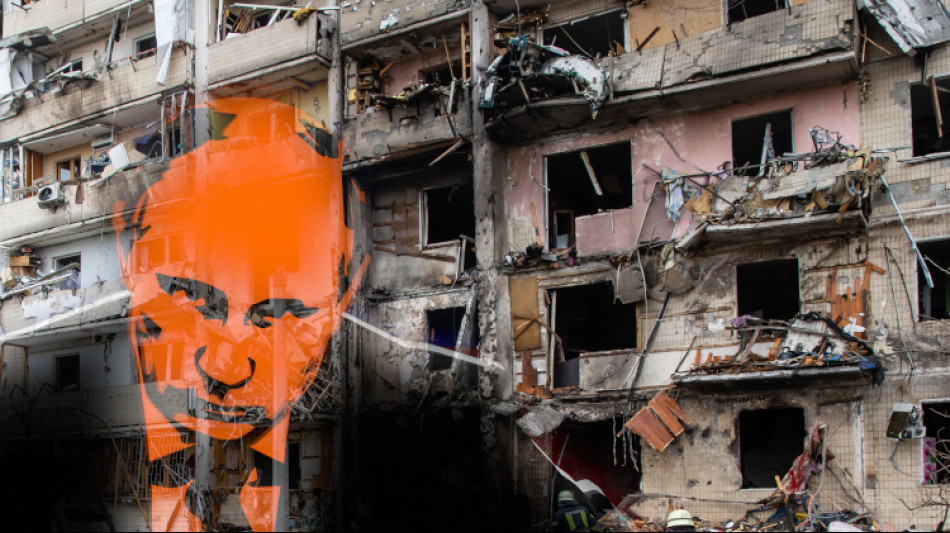
Russia in Ukraine: murder, torture, looting, rape!




